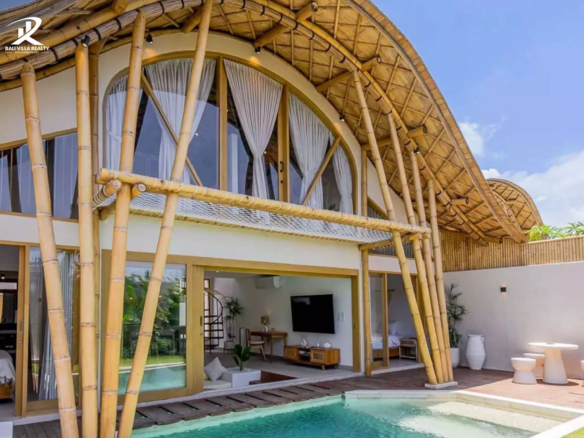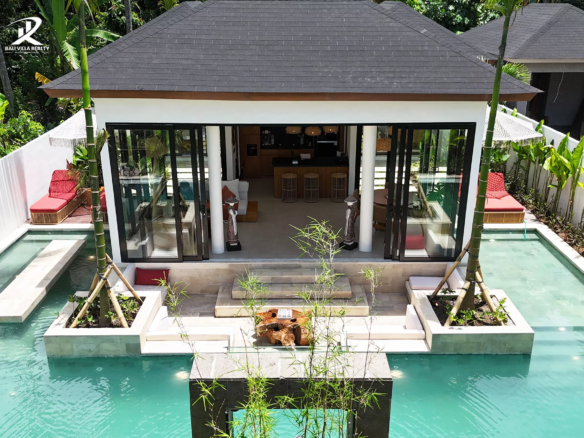Key Takeaways
- Bali’s economy is booming, driven by foreign investment and tourism growth; offering strong opportunities across property, hospitality, retail, and wellness sectors.
- Real estate remains the top investment, with 10–15% annual rental yields and fast payback (5–6 years), especially for villas and off-plan developments.
- Foreigners can legally invest by setting up a PT PMA company, ensuring full compliance and ownership rights.
- Main risks include heavy reliance on tourism, legal complexity, and market competition — but with the right partners and planning, Bali offers strong long-term growth potential.
Bali is not just a place to unwind, it’s a place to build your wealth. The island offers some of the most profitable investment opportunities in Southeast Asia.
In 2024, Bali’s economy grew by 5.48%, outperforming Indonesia’s national average of 5.03%. This growth is driven by strong foreign investment, which reached USD 710.2 million in the first half of the year.
From villas and hotels to restaurants, shops, and gyms, Bali offers many opportunities for fast ROI while enjoying the island lifestyle. This guide explores the most profitable business options and helps you choose investments that match your goals and long-term plans.

Most Profitable Business in Bali to Invest in 2026
1. Property Investment (Real Estate)

Most profitable business in Bali is real estate or property investment.
Property investment in Bali is one of the fastest-growing and most stable opportunities for foreigners. Investors can achieve rental yields of 10–15% per year; much higher than the global average of around 5%.
The short-term rental market in Bali (such as Airbnb business) is already strong, with average occupancy rates around 68–70% mid-year (Aug/Sep 2025) and more than 75% in Nusa Dua.
On top of that, Bali is becoming a hub for digital nomads who are seeking long-term housing. This growing demand allows investors to recover their capital within 5–6 years, sometimes even faster.
Beyond villa ownership, Bali’s real estate ecosystem offers multiple income streams:
- Villa construction firms serving the demand for custom-designed properties.
- Real estate agencies offering buy/sell villa services, property management, and rental marketing.
- Architectural & interior design studios blending modern luxury with Balinese aesthetics.
- Renewable energy & solar companies supporting Bali’s shift toward sustainable living.
Download Bali Property Investment Guide (PDF) Here
2. Tourism and Hospitality Business
Since Bali’s tourism recovery, millions of visitors have returned to the island. However, they’re no longer just looking for a place to stay. Today’s travelers want meaningful, memorable experiences they can truly feel, as highlighted in our 2026 travel trend outlook.
Culinary tours and co-living spaces for digital nomads are also taking off. That’s why integrated concepts like resorts with dining, spas, and even co-working spaces are becoming popular today.
To succeed in this space, good design and seamless service matter a lot. People don’t just remember the room; they remember how easy, beautiful, and enjoyable everything felt, which makes them want to come back or recommend your business to their relatives.
Read More: Can You Make Money in Bali Without a Work Permit?
3. Opening a Restaurant

Opening a restaurant in Bali has become one of the most talked-about investment trends, especially among foreigners.
Popular areas like Seminyak, Canggu, and Kuta are famous for their vibrant dining scenes, a mix of world-class cuisine and stylish design that attracts both tourists and locals.
Despite rising competition, opportunities remain. The constant flow of international visitors and Bali’s thriving food culture mean there’s still room for innovative, well-run concepts to succeed.
Many new restaurant concepts are designed with a social media–friendly aesthetic in mind: stunning interiors, creative plating, and visually appealing spaces that look great online.
A good example is Gigi Susu café in Canggu, which is blowing up online for its aesthetic, Pinterest-perfect vibe.

4. Sustainable and Green Tourism
Then there’s sustainable and green tourism, a sector growing because travelers want to enjoy Bali without harming it.
Eco-lodges powered by renewable energy, organic farms, zero-waste cafés, ethical skincare, and upcycled fashion labels. These are the types of businesses that stand out today.
But sustainability only works when it’s real. Not just marketing, but actual eco-systems built with local communities, transparent practices, and respect for nature.
Read More: How Eco-Friendly Villas Add More Value to Your Bali Investment
5. Owning a Commercial Shop

While online shopping dominates much of the world, Bali remains an exception. Visitors here still love in-person shopping experiences, strolling through boutiques, markets, and galleries as part of their island journey.
This makes Bali’s retail sector remarkably resilient. As long as tourism thrives, local shopping will remain integral to the island’s economy.
Popular retail niches include jewelry, fashion, textiles, art, and home décor, often inspired by Bali’s craftsmanship and culture.
For creative entrepreneurs passionate about design or sustainability, launching a boutique or brand in Bali can be both profitable and fulfilling, with lower startup costs and faster access to international markets through tourism exposure.
6. Sport and Wellness Service
Bali’s wellness industry is thriving, and it’s no longer just about spa treatments. The scene has expanded into full lifestyle experiences and personal transformation.
Today, you’ll find everything from yoga retreats and meditation centers to high-end gyms, padel courts, and even pole fitness studios.
Entrepreneurs who understand this growing shift towards holistic, mindful living are seeing strong business potential, while also building something meaningful and fulfilling.
So how does wellness in Bali really work? Many modern retreats are designed as all-in-one journeys, blending yoga and movement practices with meditation, plant-based dining, and cultural experiences.
Some go even deeper by incorporating traditional Balinese healing methods and philosophies, which adds authenticity and emotional depth for international guests.
One more key factor: the setting. The most memorable wellness escapes are often tucked between rice terraces, beside rivers, or surrounded by jungle.
Places like that make people feel grounded, calm, and connected to nature. And that connection is often what keeps guests coming back.
Read More: Do You Need a Specific Visa to Buy a Villa in Bali?
Can You Start Your Own Business as a Foreigner?
Yes, foreigners can start a business in Bali, Indonesia. However, there are specific regulations and procedures to follow:
- Legal structure: Most investors establish a PT PMA (Foreign Investment Company), which allows full foreign ownership.
- Partnerships: Another route is forming a joint venture with an Indonesian partner.
- Documentation: You’ll need a business plan, identification, and registration paperwork.
With the right setup, foreigners can safely and successfully operate profitable businesses in Bali. Learn more here: Can Foreigners Buy Property in Bali? Full Guide for You
Step-by-Step Starting a Business in Bali as a Foreigner
Starting a business in Bali as a foreigner is an exciting journey that involves navigating a specific legal process. Here's the general overview:
1. Prepare Your Business Plan
Before you dive into legalities, get clear on your business foundation.
- Check Your Business Field: Indonesia has a "Positive Investment List" that classifies business sectors. You need to ensure your business idea is in an "open" or "open with conditions" sector for foreign investors. A common mistake is picking a similar-looking business activity that has different ownership rules.
- Understand Ownership Rules: In fully "open" sectors, you can own 100% of the business. In "open with conditions" sectors, you may need local partners and may own between 49-71%.
- Get a Local Address: Your company needs a registered business address in Bali. This can be a physical office or a virtual office service offered by many agents.
2. Register Your PT PMA Company
This is the core legal process. Using a reputable local agent is highly recommended to navigate the steps smoothly.
The general steps include:
- You choose and reserve your company name. Most importantly, you determine the exact KBLI code—the official classification for your business activity.
- A public notary drafts your company's legal constitution (Articles of Association), detailing shareholders, capital, and business activities
- The notary submits the deed to the Ministry of Law and Human Rights (MOLHR) for approval.
- Register your new company with the tax office to get a corporate Tax Identification Number (NPWP).
- Apply for a Business Identification Number (NIB) through the government's Online Single Submission (OSS) system. For many low-risk businesses, this also serves as your primary business license.
For a deeper breakdown of PT PMA (costs, structure, and regulations), check out our full guide: How to Set Up a PT PMA in Indonesia: Requirements, Process, and Costs
3. Handle Post-Registration Essentials
With your legal entity in place, there are a few more critical tasks.
- Open a Corporate Bank Account: You must use your company's NPWP and documents to open a dedicated business bank account in Indonesia.
- Get Your Work & Stay Permit: Owning a company doesn't automatically give you the right to live and work in Bali. As an investor and director, you can apply for an Investor KITAS, which is a temporary stay permit for business owners.
- Secure Specific Operational Licenses: Depending on your business, you will likely need additional sector-specific licenses from local government bodies before you can operate.

What are the Main Risks of Investing in Bali?
Bali is not only offers incredible opportunities, but also challenges (just like any other investment destination). One of the biggest risks is overreliance on tourism.
Since much of Bali’s economy depends on visitors, global events like pandemics or travel restrictions can affect returns. That’s why solid financial planning and cash-flow management are essential to handle slow periods.
Foreign investors also face regulatory and legal complexities. Navigating Indonesia’s business regulations, taxes, and land ownership rules requires professional guidance, but with the right structure, everything can be done properly and safely.
Other key challenges include:
- Land ownership restrictions, as foreigners can’t directly own land.
- Cultural and language barriers can affect communication and management.
- Infrastructure and environmental issues, such as waste management and water supply.
- Competition and market saturation, especially in tourism-focused sectors.
- Currency fluctuations and rising labor costs can impact long-term margins.
- Seasonal cycles and natural risks, including volcanic activity and heavy rains.
With the right partners, due diligence, and legal setup, these risks can be effectively managed, allowing investors to focus on achieving strong returns and long-term growth potential.
Conclusion
Bali offers many business opportunities, but property investment remains one of the most stable and rewarding options for 2026 and beyond.
To truly succeed in Bali, having the right local expertise and trusted partners makes all the difference. That’s where Bali Villa Realty comes in.
With years of experience and strong local expertise, we help international investors find, manage, and grow their Bali property investments.
Ready to start or still have questions? Book a free, no-obligation consultation with our team and explore opportunities tailored to your goals.
Want to start investing in Bali property?
Have a quick chat with our real estate experts for personalized advice on your Bali investments. No commitment required.
FAQ
Starting a business in Bali can cost different amounts depending on your industry, business size, and legal setup. Expenses may include permits, licensing, office space, and staff. However, starting with a limited budget is still possible.
On average, 4–8 weeks, depending on the type of business, legal structure, and approval process.
Taxes include corporate income tax, VAT, and property tax, varying by business type and revenue.
Yes. Investors can apply for an Investor KITAS, allowing long-term stay and multiple entries.











